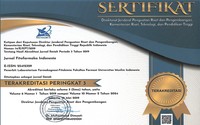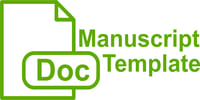Pengaruh Variasi Metode Ekstraksi Jahe dan Serai terhadap Aktivitas Antiinflamasi pada Penghambatan Denaturasi Protein
Abstract
Keywords
Full Text:
PDF (Bahasa Indonesia)References
Abidin, Z., Putri, U.A. and Widiastuti, H. (2019) ‘Potensi Anti-inflamasi Fraksi Etil Asetat Ranting Patah Tulang (Euphorbia tirucalli L.) dengan Uji Penghambatan Denaturasi Protein’, Ad-Dawaa’ Journal of Pharmaceutical Sciences, 2(2), pp. 49–52.
Fuadi, A. (2012) ‘Ultrasonik sebagai Alat Bantu Ekstraksi Oleoresin Jahe’, Jurnal Teknologi, 12(1), pp. 14–21.
Djuddawi, M.N. and Kholidha, A.N. (2019) ‘Uji Efektivitas Ekstrak Serai (Cymbopogon citratus) Terhadap Penyembuhan Luka Sayat pada Mencit Putih’, Jurnal Surya Medika, 5(1), pp. 13–21.
Handayani, P.A. and Nurcahyanti, H. (2015) ‘Ekstraksi Minyak Atsiri Daun Zodia (Evodia suaveolens) dengan Metode Maserasi dan Distilasi Air’, Jurnal Bahan Alam Terbarukan, 4(1), pp. 1–7. Available at: https://doi.org/10.15294/jbat.v3i1.3095.
Hardjono Satrohamidjojo (2021) Kimia Minyak Atsiri. Yogyakarta: Gadjah Mada University Press.
Reynaldi, R. and Yani, D.F. (2021) ‘Potensi Anti-Inflamasi Ekstrak Etanol Daun Cocor Bebek (Kalanchoe pinnata L) terhadap Denaturasi Protein secara In vitro’, SPIN Jurnal Kimia & Pendidikan Kimia , 3(1), pp. 12–21. Available at: https://doi.org/10.20414/spin.v3i1.2977.
Williams, L.A.D. et al. (2008) ‘The in vitro Anti-denaturation Effects Induced by Natural Products and Non-steroidal Compounds in Heat Treated (Immunogenic) Bovine Serum Albumin is Proposed as a Screening Assay for the Detection of Anti-inflammatory Compounds, without the use of Animals, in the Early Stages of the Drug Discovery Process’, West Indian Med J, 57(4), pp. 327–378. Available at: https://doi.org/10.1215/9780822388630-010.
Yani, D.F. and Fatahillah, R. (2022) ‘Anti-Inflammatory Activity of Ethanol Extract and Ethyl Acetate Fraction of Kebiul (Caesalpinia bonduc L.) Seed Coat Against Inhibition of Protein Denaturation’, Jurnal Kimia Riset, 7(1), pp. 1–8.
DOI: https://doi.org/10.33096/jffi.v11i1.1184
Copyright (c) 2024 Faradiba Faradiba, Rezki Amriati Amriati Syarif, A Tenri Mifta Khaira, Tifani Kursya Alyanti

This work is licensed under a Creative Commons Attribution-ShareAlike 4.0 International License.
Indexed by:
ISSN: 2356-0398 | e-ISSN: 2541-2329
Editor's Address:
Third Floor Pharmacognosy-phytochemistry laboratory building, Urip Sumoharjo road km. 5 Campus II UMI, Makassar, South Sulawesi, Indonesia
Phone: +6281524045514
Fax: +62411425619
E-mail: editorjfi@umi.ac.id

















.jpg)

